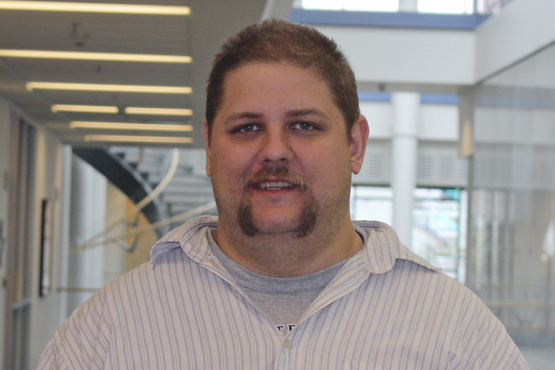Dreslinski named Wellman Professor for outstanding research in energy efficient processors
Dreslinski is working with a $9.5million DARPA grant to overcome the limitations of Moore’s Law

 Enlarge
Enlarge
Ron Dreslinski, assistant professor in Computer Science and Engineering, has been named a Morris Wellman Faculty Development Professor.
Dreslinski works in the area of energy efficient processor architectures, a subject that has evolved from his dissertation work at Michigan. His project took the position that approaches to the impending end of Moore’s Law, brought on by the energy dissipation limitations of CMOS, must come from enhanced devices, design styles, and architectures, rather than a reliance on the emergence of radically new technologies.
This approach has guided his work since. He’s particularly interested in the power offered by ASICs, an alternative processor design that is custom-built to process certain tasks incredibly rapidly. These chips sacrifice the general-purpose quality offered by CPUs, but are currently among the fastest processors the industry has to offer.
In search of a better way, Dreslinski is now working with a $9.5million DARPA grant to develop a hardware architecture and software ecosystem that together can approach the power of ASICs with the flexibility of a CPU. Called Transmuter, this “software-defined hardware” can change how programs use the hardware available to them in real time, effectively acting as a reconfigurable computer.
With this smart balancing of available hardware and application demands, Dreslinski and his collaborators expect Transmuter to offer unprecedented energy efficiency and a raw performance two orders of magnitude better than today’s CPUs, and within an order of magnitude of ASIC designs. The system will be optimized for data intensive algorithms, like image and video understanding and graph analytics.
In his past work, Dreslinski examined the universal application of aggressive low voltage operation across computation platforms. Using an approach called “near-threshold computing,” he worked to overcome the barriers that have historically kept ultra-low voltage operation to niche markets. Dreslinski designed a prototype that operated at near-threshold levels, but that also boosted selected cores when single thread performance was needed. The prototype passed all tests and demonstrated a more than 6x improvement in energy efficiency over conventional processors.
Previously, Dreslinski earned the IEEE TCCA Young Computer Architect Award and was recognized by the College of Engineering with the Kenneth M. Reese Outstanding Research Scientist Award in 2015.
About the Morris Wellman Faculty Development Professorship
Michael P. Wellman, Lynn A. Conway Collegiate Professor of Computer Science and Engineering, endowed the Morris Wellman Faculty Development Professorship in his grandfather’s name. Morris Wellman was an engineer who worked for most of his career as a civil servant of the City of New York. The professorship is awarded to junior faculty members in recognition of outstanding contributions to teaching and research.
 MENU
MENU 
